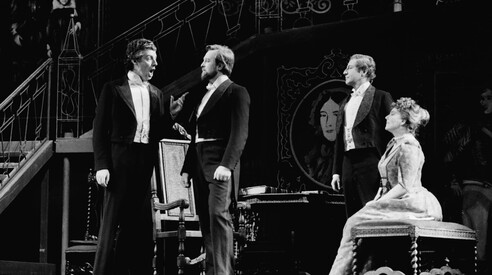“Owen Wingrave” at the Itria Valley Festival


A rehearsal for the opera's theatrical premiere at the Royal Opera House, London, 1973 (Getty Images)
on stage
Fifty-four years after its television debut, Benjamin Britten's pacifist opera for the BBC arrives in Italy. A masterpiece revealed.
On the same topic:
After just 54 years, Benjamin Britten 's Owen Wingrave arrives in Italy, perhaps the first opera in history to debut on television (in 1971, commissioned by the BBC). Better late than never, of course, and hats off to the Itria Valley Festival in Martina Franca, trulli and trills in a dreamlike baroque setting, where the new artistic director, Silvia Colasanti, is doing a remarkable job: we also saw a super-complete and, more importantly, very beautiful Tancredi by Rossini. So, Owen Wingrave, from Henry James, Britten's pacifist manifesto, which stages the familiar clash between the individual and the society that crushes him .
Scion of generations of Wingraves who fought and died "for King and Country," Owen instead decides he won't be a soldier. He is mocked, insulted, and disinherited by his general grandfather and his bitchy aunt, as well as by his fiancée and her mother-in-law, until the final tragedy in the Gothic ghost room where a distant Wingrave had killed a cowardly son. Britten, it seems, didn't own a television and certainly didn't love one: and yet the opera's original purpose is evident in the dramatic construction, which proceeds through shot and reverse shot . There is very little actual action, starting with the fact that the final catastrophe takes place offstage: instead, there is a lot of talking, between barracks and Victorian drawing rooms (if there was a difference), and gloomy dining rooms where the dreadful family gathers. As usual, in Britten, what is left unsaid is as strong as what is stated. The real conflict is entirely psychological, and leads to Owen's self-acceptance, who is not at all a weeping willow or a weakling, but a determined man who considers himself a fighter, even if for the cause of those who do not want to fight (the irenic-silly pacifists who are all the rage these days should reflect on this, at least those who are not in bad faith).
Musically, it's a terminal Britten, combining rigorous construction with extraordinary essentiality, confirming his status as the greatest opera composer of the second half of the twentieth century. If the avant-garde's high priests didn't like it, or liked it only slightly, well, so be it. We want more Britten from the theaters, and not just today. (In fact, while we're at it with the orders: please bring us a Gloriana too. Written in 1952 for the coronation of Elizabeth II, its premiere performance, it has never been performed in Italy.) Martina's performance was top-notch. Daniel Cohen, the conductor, was excellent, building the tension of a music that speaks of anguish, and both the Orchestra of the Accademia della Scala and the Paolo Grassi Foundation Children's Chorus performed admirably . Andrea De Rosa's performance was simple and intelligible, rightly focusing on the narrative, adding a few but always well-chosen ideas. And overall, the company was excellent, dominated, like Owen, by a baritone who is perhaps a short tenor and therefore a bit uncomfortable in the bass, Äneas Humm, but who cares, he's a great artist. For once, Martina's masterpiece wasn't rediscovered, but revealed. Bravo!
More on these topics:
ilmanifesto





